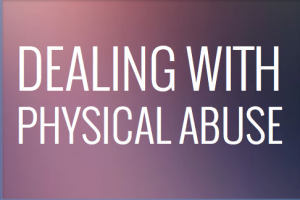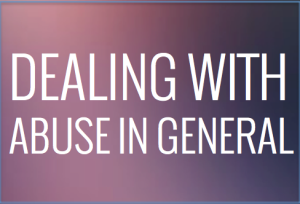Even if you are thinking of giving your abusive husband another chance, it is vital for you to have a personal safety plan or strategy which will keep you safe at home. The difference between life and death is very little in these cases, and you need to remain protected to keep yourself safe and alive.
What you will find on this page:




1.Tell a trusted friend or family member what is going on.
Tell your friend or family member about the abuse in as much detail as possible. Show them proof if you feel that they don’t believe you. This way, if you are having a rough time, they can come and take you away (even if only for a little while).
2. Know your options in a case of emergency. Make a list of people you can call to stay with:
-Family: If your parents/siblings are supportive, then you need to make sure that they can protect you because this is the first place your husband/in-laws will check. They will most likely come under the pretence of ‘mediation’, but then emotionally blackmail your family to let you go with them. Use your family’s help to go to a distant relative or friend that is unknown to your husband/in-laws.
-Friends: Will they pick you up in the middle of the night? Do they have access to a car? Keep a burqa (to disguise you) and a spare bag at hand.
-Organisations: Are there any organisations that can help you? Do they provide or refer you to counseling services and legal assistance? Do they help you to get a job and permanent housing? In case of doubt, use our resources page to figure out which organisations and shelters can help you and how.
It is vital that – in the case of family, friends, and colleagues – you test their reliability and trustworthiness first, as discussed in point 1(see above).
3. Make a list of pros and cons, advantages and disadvantages of leaving. Be realistic about both situations and re-evaluate your options on a regular basis. What sounds like a good option today may not work well tomorrow. Don’t act impulsively on such an important decision. Take time to carefully strategize and evaluate your options.
4. Pack an emergency bag with things such as:
Clothes, toothbrush and other necessities, non-perishable food, special blanket or toys for the children, cash, cheque book, ATM/bank and credit cards, phone numbers of friends and organisations which can help you, copies of important documents (personal identification, birth certificates, passport and NIC, driver’s licence, school and medical records, deed of ownership for the house or car, car papers, insurance papers, tax returns), extra keys for your car and house, etc. Leave the bag at home (in a hidden place) or with a trustworthy friend/relative. Do not leave it at your parents’ house if they are not fully behind you leaving.
5. Record evidence of your husband’s/in-law’s abuse. Try to record the voice of your abuser or try to take a picture/video of physical assault. This can be very useful if you are filing for divorce, claiming child custody, or proving to your family that you are telling the truth. But ONLY do this when it is SAFE to do so.
6. Always document and save all harassing phone calls and encounters. Keep digital and paper copies of texts and emails. Document any evidence of bruises.
7. If your children are old enough to understand what is going on and if there is someone you can trust to help you, teach your children how to call them for help when you are being physically assaulted. Teach them a code word that you can use in a case of emergency.
8. Memorise or keep a list of telephone numbers in your wallet of people who will help you.
9. In case your husband, in-laws, or family want to lock you in the house/room, make sure to have a spare set of keys hidden in your emergency bag.
10. Save enough money for a flat deposit and for up to three months of rent (if possible).
11. Keep your room clear of weapons and other sharp objects: If you have a knife holder/rack, either put it in a place that is hard to reach or put the knives in a safe place. If there are guns in the house, hide them in a safe place or – in a case of emergency – know how to unlock them. If there are acids or other dangerous chemicals in the house, avoid the room in which they are in at all costs. If you think you may be set on fire, call the police immediately!
12. If you are sleeping in separate bedrooms, lock and barricade the door so that he can’t attack you while you are sleeping. Have a spare phone (that nobody else is aware of) hidden in your bra or in the room you think your in-laws or husband might lock you in. This will allow you to send a message to your family and friends to rescue you.
13. What you should do if there is an argument or a threat of violence: Try to move to a room where you cannot be trapped or where there are no guns/acid/oil. If possible, avoid the bathroom, garage, basement, or any rooms without access to a window or external door. If your in-laws are not abusive, take the fight to where they are and insist on sleeping in the same room as them so that you can spend the night in safety.
14. Consider learning some basic self-defense techniques to protect yourself from harm. This will also increase your self-confidence and emotional strength. But beware! It is not advisable to fight your husband because most women can easily be overpowered by an angry man and you may put yourself in serious danger or get killed by trying to fight back.
15. Keep your mobile phone charged, always and have some key numbers on speed-dial: You never know when an unsafe situation might erupt, so have the number of police, ambulance, friends and family on speed dial. Additionally, try to always keep your mobile phone charged because it can be life-saving in tough situations.
16. If you have a smart-phone, download a personal safety app: Downloading a safety app can be useful if you have a trusted circle of friends and family who can be alerted automatically by the app if you are in danger. Some safety apps include P.F.O. and Circle of 6.
17. Always surround yourself with people when possible: Whether it is inviting relatives over for when your husband is on holidays or going to stay with relatives/family if he lets you – try to surround yourself with people. This might not be possible all the time but the chances are that the less time you spend alone with your husband, the less the chance of violence and extreme abuse. Even if violence does happen, at least it might be diffused by other people.
What do you do during and after a fight?
1. Try to diffuse the situation and to quench his anger by staying as calm as you can. Do things that assure him you are listening. Be careful about hitting back or picking up things (glass, books, mobile) to throw at him. This may make him want to grab these things from you and hit you, causing much more damage.
2. Do not argue or talk back if that agitates him. An abuser never wants to admit his own fault, but only wants to find excuses to abuse you.
3. If the noise wakes up your children or if they are present in the room with you, try to position yourself away from the children to protect them from the abuser. If they are old enough to remember the code word you taught them, then say it so they can go and get help, i.e. call your father, brother, in-laws, or friend.
4. If things are getting very violent and you are at risk of serious injury, then run to your in-laws or call your parents/friends immediately. If the abuser is distracted or has to go to the toilet, use the opportunity to grab your children, the emergency bag, your purse, and the keys, and drive away from the house. If you don’t have a car, then call for help as soon as you have a chance to do so.
5. If you are unable to escape immediately, wait until the abuser is asleep or make an excuse to check on the children. If you cannot leave the house with your children, then leave and plan to come back to get them with the help of family and friends.
6. If you are hurt and need medical attention, then wait until the abuser is distracted or asleep and call your family/friends for help or go to your in-laws. Keep some bandages and antiseptic agent in the bathroom. If you are calling your family/friends, call them from where your husband cannot hear you. If you think that he will continue beating you, lock yourself in a safe room until your family/friends get to your house.
7. If you see the abuser with a gun/knife/pillow/oil/acid in his hand, DO NOT attempt to pacify him and LEAVE immediately!
8. Keep a spare phone with you (hidden from view) at all times because your husband might confiscate your normal phone during a fight to stop you from calling someone for help. If you are calling your family/friends, call them from where your husband cannot hear you. If you think that he will continue beating you, lock yourself in a safe room until your family/friends get to your house. If nobody lives near you, call the police immediately! Don’t try to run on foot if there is no rickshaw/taxi/bus near your house because your husband can outrun you on foot or overtake you in a car.
DEALING WITH PHYSICAL ABUSE: FRACTURES, BRUISES
To begin to deal with physical assault, you first need to understand the nature of what might happen to you, how to recognize a problem and how to deal with it. You would find information on some basic situations that you might encounter below:
What is a fracture?
A bone fracture is a medical condition in which there is a break in the continuity of the bone.
What are signs and symptoms of a broken bone?
Signs and symptoms of a broken bone include:
- — Swelling or bruising over a bone.
- — Deformity of an arm or leg.
- — Pain in the injured area that gets worse when the area is moved or pressure is applied.
- — Loss of function in the injured area.
- — In open fractures, bone protruding from the skin.
Here are some links on how to treat a fracture and bruises:
How to treat bone fractures?
This link discusses nearly everything about fractures in an uncomplicated manner.
This is the Wikipedia link to Bone Fractures. The article includes a basic medical overview of the injury.
Bruise Treatment:
Other than bone fractures, you might have to deal with bruises. Here’s a couple of links on how you can treat a bruise by way of first aid:
Below are links with some tips on how better to take care of your bruises:
Make a Bruise Go Away Faster
No matter how long you have been abused, whether that maltreatment took the form of psychological, sexual and/or physical bullying, the emotional trauma is extensive. No one can pretend that there is a quick fix to take the pain away, but there are accessible support systems out there that offer advice on how you can begin to help yourself cope, to gradually work to recover your positivity and self esteem.
The techniques you can employ to cope and begin to come to terms with the abuse you have suffered vary depending on:
a) Whether you remain in an abusive relationship and/or continue to have contact with the abuser
b) How long and how intensively you have been abused
c) What form this abuse took
d) Whether you are required to continue to revisit the abuse, for example, due to legal proceedings or ongoing medical treatment.
Wikihow can offer some useful and realistic advice for you who suffered emotional abuse at the hands of a partner you continue to be in a relationship with and/or family members you continue to live with. They offer nine steps to guide self-help for you in these circumstances:
1) Accept that you cannot force change in your abuser but in some cases you can attempt to show your abuser how you are suffering and hope that this might change the thought patterns of your abuser
2) You should not change their behaviour as a defensive measure or to soothe a circumstantial issue, rather you might choose to set yourself a positive goal to gradually give yourself the positivity and energy to achieve Step 1. It is not safe to try to transform an abuser. Abusers have control over their behaviour. Any attempt to change their behaviour might be seen as a challenge to their authority by them and this could become dangerous for you.
3) If you feel your abuser wants to sincerely change his behaviour (Be cautious of pretense!), set reasonable goals for change where you feel that you might be able to help stimulate change in your abuser. It is important that the goals that you set yourself are achievable and realistic. For instance, an addicted partner might identify alcoholism as a problem and ask you to help him through a enrolling in a rehab program. To help them through this is an achievable goal. However, an abuser asking you to ‘stop provoking me!’, ‘stop talking to your cousin’, ‘start covering your head and I’ll stop beating you!’ shows no respect for your choice and lack of responsibility. It is unlikely such behaviour will change. Ultimately, if the abuse is long term, consistent and/or severe, your commitment to a healthy, respectful relationship requires the termination of the current, abusive one. You do not deserve to live in fear!
4) Set boundaries where it is possible for you to begin to discuss your experience with your abuser. It is important to establish what you consider respectful communication and what you expect to give and receive from the relationship. Even where communication with your abuser is impossible, it can be a helpful step in your recovery to identify for yourself what behaviour you expect from a respectful and healthy relationship. Be wary of your abuser trying to ‘trick you’ into revealing your plans for the future. Always keep yourself safe by withholding information that can be used against you by your abuser. Approach this stage with caution. It is imperative you gauge the risks in engaging in an open conversation about how you feel. If you feel fearful for any reason, please message someone before hand to inform them to check on you after the conversation. Where boundaries have been discussed and accepted by you and your abuser, you should not tolerate repeated offenses of minor abuse more than 30% in the initial stages of rebuilding the relationship. As a response, your abuser might consider pulling away from the relationship temporarily, but this does not mean abandoning the relationship altogether. If the abuse remains persistent and/or becomes increasingly severe you must try to accept that the relationship cannot be saved and you should leave.
5) Develop emotional intelligence. If you feel you can talk to your partner and he is willing to change – both you and your abuser must be willing to learn new ways of feeling and expressing your true emotions to end the pattern of blaming, shaming, and punishing. However, remember that the responsibility of abuse and violence lies with the abuser and not you. No matter how he thinks ‘you provoke’ him, it is his choice to resort to abuse. You cannot be held responsible for his actions. Therefore, you would only benefit from expressing your deepest and strongest feelings only in forms where you will receive the fullest respect and support. If you feel you need to vent out how you feel, do consider keeping a diary, a blog, a group of very close friends or trusted family members and a professional, respectable psychologist. You can also use the ‘You are not alone’ section of Chayn to go to the Catharsis room to share how you feel anonymously.
6) Understand the dynamics of the relationships. Where is it safe for you to stay with your partner or relative who abused you, that is where the abuser has shown willingness to communicate with you and changed their abusive behaviour? Then it is important to understand what the positive and negative dynamics of the relationship were and how it was that abusive patterns emerged within it. Even where it is safest for you to leave the relationship, it can be a useful learning experience for you so that you might learn how to recognize and create safe and supportive relationships in the future.
7) You should identify your sources of safety. This means you must trust your instinct when a situation and/or relationship might be a dangerous one. It is important for you to remember that your partner, parents or siblings do not decide what safety and security means for you rather you should know what is safe for you and which situations and environments you feel secure in. No one but yourself suffers the consequences of actions where you might be unsafe. Therefore, listen to your gut instinct after examining all the logical arguments for a decision.
8) Professional help can be an invaluable source for you while coping with emotional abuse. More information on what is meant by ‘professional help’ and where to can be found here
9) Know when to leave the relationship or abusive environment as there are times when the relationship cannot be saved and you do not deserve to live in persistent misery with your abuser. It is not your fate! And for your own sake don’t accept it as your fate- ever!
To some extent the steps outlined above may also offer some support to victims of physical abuse and sexual abuse which involves and/or results in emotional bullying and psychological trauma. However, physical and sexual violence, even if minor and/or infrequent at first, often escalates over time and puts you at a considerable risk. Therefore, you (victims of domestic violence) should be extremely wary of trying to rebuild the relationship and the steps above are best used as a guide for your recovery, leaving the abusive relationship, to help you understand what you need from a relationship and what you should expect from a future, respectful partner.
For those of you, who are still in an abusive relationship, Women’s Aid UK has provided an online handbook to help you who have been victims of sexual and physical abuse. While the context is based in the UK, some information will very useful for you. It is available in Urdu and Punjabi as well as English
Online support: Remember – If you continue to live with your abuser it is advisable to take the following two steps when accessing online support:
1) Use a safe computer outside of the home such as that of a trusted friend or family member or in a public place such as a community library
2) Change normal email passwords or create a new email account so that your abuser won’t be able to access any correspondence you have had with online support
For more on staying safe online, click here.
Dealing with addicted husbands
Firstly, know this: It is not only the alcohol or drugs that make him violent.
You may be one of very few people who see your husband when drunk or under the influence of drugs. This does not mean that he is not addicted, or that you deserve to be treated that way. Even if your family or his denies it, it doesn’t change the fact that he is in fact addicted. You are not the cause of his behaviour. Neither is the alcohol or the drugs. Alcohol and drugs can distort your husband’s thought process and he can exaggerate a feeling, e.g. of anger, but the choice of striking or hurting you is still his. Addictive substances are a smoke screen for the real problem underneath – that this man thinks it is acceptable to treat you badly. A non-abusive person will never hit you even if under the influence of drugs and alcohol.
Addiction and abuse have many similarities. They may be cyclical and thus re-occur after you thought they had finally stopped. Be aware of this and do not trust that your husband will never hurt you again if he stops drinking or taking drugs. They both have a negative impact on your family life, as well as intimacy and sexual relationships. The controlling nature of addiction can isolate you from family and friends which makes you more vulnerable. Know that there are women around the world who support you and believe that you should not have to suffer like this.
Addictive substances increase the feeling of power in the user – at times this feeling might result in him forcing or manipulating you to join him in using drugs. This is dangerous for your health so try and avoid it if possible. Sometimes refusal can anger your partner more when he is under the influence than if he were sober. In this case, try to placate him and call for help as soon as it is safe and possible to do so.
Alcohol and drug addiction are big problems but such addiction is never the root cause of domestic violence. If you are being hurt by your partner then this can continue even if he becomes sober. Similarly, he may find other excuses/justifications for his behaviour.


